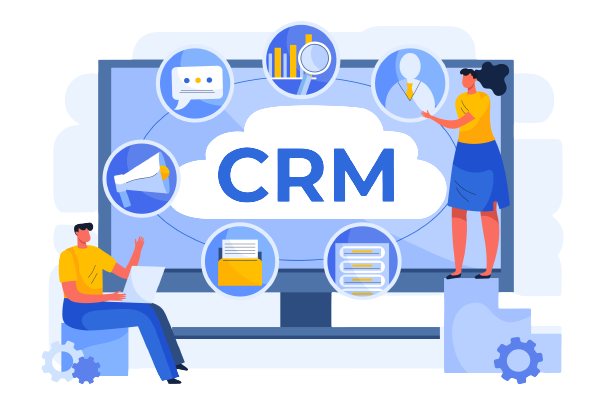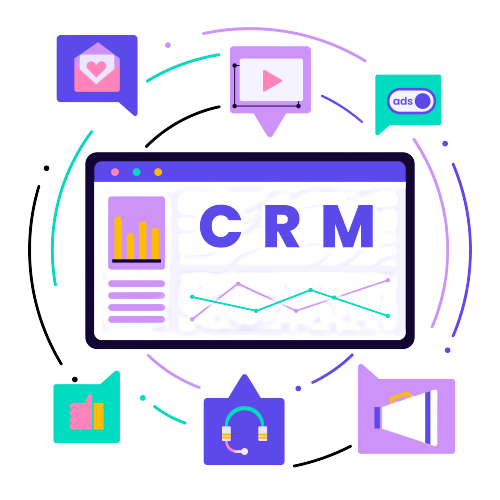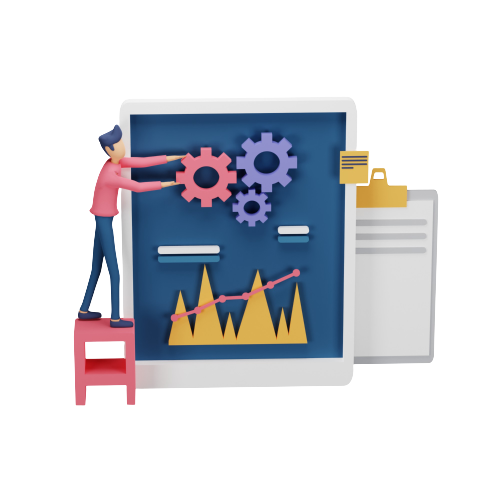
In this digital age, Customer Relationship Management (CRM) has evolved from being just a buzzword to an indispensable tool for businesses of all sizes and industries. CRM systems are no longer mere repositories built to help you with contact information but today’s CRM software are robust platforms designed to streamline your customer interactions, foster brand loyalty, and drive revenue growth effortlessly. However, in the vast landscape of features of CRM software, determining the most critical ones for your business can be a daunting task. So, in this comprehensive guide, let’s navigate through the world of features of CRM software so that you can identify and prioritize the essential features that can truly transform your business. But before you start exploring the features of CRM software let’s take a step back to understand CRM software as a whole and its evolution.
The Evolution of CRM

Before delving into the intricacies of CRM features, it’s essential to understand the evolution of CRM and why it’s crucial for your modern business. CRM systems have come a long way from their origins as basic contact management tools. The new features of CRM software have transformed this software into a powerful platform that can easily streamline your customer interactions, foster brand loyalty, and drive revenue growth. The evolution of CRM can be divided into several key phases such as:
Phase 1: Contact Management
At the core of CRM’s evolution is Phase 1, where the features of CRM software include basic contact management tools. These features of CRM software primarily served as digital address books that allowed businesses to organize and store customer contact details. This phase marked the foundation for features of CRM software, focusing on maintaining and accessing critical customer information.
Phase 2: Sales Automation
Phase 2 introduced sales automation features to CRM software. This significant leap in the features of CRM software allowed businesses to automate various sales-related tasks, such as lead tracking, opportunity management, and visualizing the sales pipeline. The sales automation feature of CRM software enhanced sales teams’ efficiency and effectiveness, making it easier to manage leads, forecast sales, and close deals.
Phase 3: Marketing Automation
As digital marketing features of CRM software gained prominence, the feature of CRM software in Phase 3 incorporated marketing automation. This development facilitated the creation, scheduling, and analysis of marketing campaigns, enabling businesses to conduct more targeted and effective customer outreach. With marketing automation, CRM became a tool for enhancing marketing strategies.
Phase 4: Customer Support and Service
Exceptional customer support and service became a focal point in CRM’s evolution. Phase 4 introduced features of CRM software like ticketing systems, knowledge bases, and chat support, enabling businesses to provide efficient and effective customer service. The focus shifted from just acquiring and retaining customers to nurturing relationships through top-notch support.
Phase 5: Data Management and Analytics
The data-driven era prompted CRM systems to incorporate features for data management and analytics in Phase 5. Businesses aimed to derive actionable insights from the data they collected. The new features of CRM software included reporting, analytics, and data integration capabilities, which allowed businesses to track performance, identify trends, and make data-driven decisions.
Phase 6: Customization and Scalability
The final phase of CRM’s evolution focused on customization and scalability. CRM systems realized that businesses are not one-size-fits-all, and customization features of CRM software were introduced to make CRM systems adaptable to unique business needs. Custom fields, workflows, and scalability features of CRM software allowed businesses to configure their CRM systems according to specific processes and scale as they grew.
Now that the evolution of features of CRM software is clear to you, let’s take a look at the primary steps that can help you determine the most critical features of CRM software.
Understanding Your Business Objectives

Before determining the critical features of CRM software for your business, you must establish a clear understanding of your business objectives. This step will help you to ensure that your CRM strategy seamlessly aligns with your broader goals and objectives. To gain this clarity, consider questions such as:
- What are your primary business objectives?
- Are you aiming for revenue growth, customer retention, or operational efficiency?
- How does customer relationship management fit into your larger business strategy?
- What industry-specific challenges and opportunities do you face?
By asking these questions, you can gain a solid grasp of your overarching goals and industry landscape. With answers to these questions, you can begin to identify the CRM features that would be essential for your success. Now let’s explore the important features of CRM software to help you identify what would be the most critical for your success.
Important Features of CRM Software

Customer-Centric Features
At the heart of CRM is the customer. Building and nurturing strong relationships with your customers is the ultimate goal, and to achieve this, several customer-centric features are typically considered critical, some important customer-centric features of CRM software include:
- Contact Management
Contact management is the foundational feature of CRM software, it can provide you a comprehensive repository for customer data, including contact details, communication history, and other pertinent information. This feature is non-negotiable especially if you are looking to enhance and manage customer relationships.
- Lead Management
No matter what kind of business you have, lead generation and management are a must. With the appropriate features of CRM software, you can both generate and manage these leads seamlessly. The lead management feature of CRM software can both track and nurture your potential customers from their initial expression of interest to eventual conversion. As a result, this feature can significantly impact your sales and marketing efforts.
- Sales Automation
he sales automation feature of CRM software can also enable you to automate your entire sales process to move your customers down the sales funnel seamlessly. This feature of CRM software can streamline your sales process, making it easier for your team to manage leads, track deals, and close sales more efficiently. These characteristics make the sales automation feature of CRM software an indispensable feature especially if your focus is to grow your sales rate.
- Marketing Automation
In this digital age, you need marketing automation features of CRM software to be successful. This specific feature of CRM software can empower you to create, schedule, and analyze your marketing campaigns, which can even help you develop and maintain effective marketing strategies. So, if your goal is to enhance your marketing strategies this feature of CRM software is a must-have for you.
- Customer Support and Service
Exceptional customer support can be crucial for you, especially if you are aiming to retain your customers and foster brand loyalty. This specific feature of CRM software can enable you to provide efficient customer service, such as ticketing systems and knowledge bases, which are critical in today’s competitive landscape.
Data Management and Analytics

In the data-driven era, effective CRM relies on data. However, not all data is created equal. Your CRM software should help you manage, analyze, and derive valuable insights from the data you collect. Here are some data-centric features of CRM software to consider:
- Data Integration
Data integration features allow you to connect your CRM system with other essential tools and databases in your organization, such as email, marketing, and sales software. This is vital for creating a cohesive data strategy. With data integration features of CRM software, you can gather and consolidate customer data from various sources to gain a 360-degree view of your customers, which can help you understand their behaviors, preferences, and needs more comprehensively. As a result, you can enhance your customer service. Besides, data integration also simplifies and automobiles various processes within an organization, which can streamline your workflow, while helping you develop your marketing campaigns by integrating data. This specific feature of CRM software can help support your sales team to improve their performance by providing them access to real-time information on leads, opportunities, and accounts.
- Reporting and Analytics
Robust reporting and analytics features can provide you with actionable insights. You can use this feature of CRM software to track performance, identify trends, and make data-driven decisions.
- Data Security
In this area of identity theft and cybercrime, the security of customer data has become paramount. Therefore, look for features of CRM software that guarantee data privacy, compliance with regulations, and protection against data breaches. This will help you not only protect your customers’ sensitive data but also become the business of choice, as today’s customers prioritize data protection.
Customization and Scalability

Every business is unique, and your CRM system should reflect that. Customization and scalability features are essential for tailoring the features of CRM software to your specific needs, here are some features to consider:
- Custom Fields and Workflows
Custom fields and workflows can enable you to adapt the features of CRM software to your business processes. With the specific feature of CRM software, you can collect and store specific information relevant to your business and create fields for customer preferences, industry-specific data, and any other information that is unique to your organization. This feature of CRM software also improves data accuracy by allowing you to capture the precious data that points to your needs, which can enhance the quality of your customer database. It can also help you segment your customer base more effectively, allowing you to target your marketing campaigns and communication with greater precision. With custom fields and workflow features of CRM software, you can also provide enhanced service to your customers, streamline your workflows by automating repetitive tasks and standardized processes, develop your lead management efforts, and enjoy improved reporting and analytics features.
- Scalability
The needs of your business will grow and change as your business grows, which necessitates that you choose a CRM software that offers scalability as one of its prominent features. This specific feature of CRM software will ensure that your CRM grows with your business and can accommodate your evolving needs to help you compete against your competitors and remain relevant in your field, despite your growing needs and the changing industry.
Integration Capabilities
To run a business today there are many technologies that you have to take help from, and your CRM system is just one piece of the technology stack that you need to be successful. This makes it necessary that you choose a CRM system, which is known for its integration capabilities. This feature of CRM software is essential as it can ensure a seamless flow of data and processes across your organization. Therefore, make sure to look for features of CRM software that enable integration with other tools like email marketing platforms, e-commerce systems, and analytics software.
User-Friendly Interface
Another important feature of CRM software to look for is a user-friendly interface. A user-friendly interface can significantly impact the adoption and effectiveness of your CRM system. So, ensure that the CRM you choose is intuitive and easy for your team to navigate, this will reduce the learning curve and make sure that you and your teams can utilize the features of CRM software from the very day it is implemented.
Budget Considerations
While it’s essential to identify the most critical features of CRM software for your business, it’s also important to consider your budget. Some CRM systems may offer a plethora of features, but not all of them may be within your budget. Prioritize the features that align with your objectives and are within your financial reach.
Conclusion
In the world of CRM, it’s not just about the features of CRM software you can access; it’s about how effectively you leverage them to create lasting customer relationships, drive revenue growth, and achieve your business objectives. The most critical CRM features are the ones that can help you achieve these goals.
Remember that CRM is not a one-size-fits-all solution. The features that are vital for one business may not be as critical for another. By taking a strategic and thoughtful approach to CRM feature selection, you can build a customer relationship management system that truly drives your business toward success. However, if budget is a huge concern for you but you need features of CRM software to lift your business in this era of competition, you can consider free contact management software to begin with.